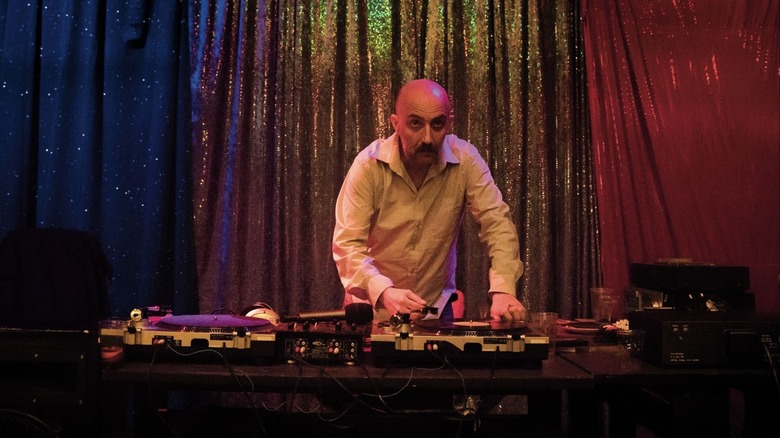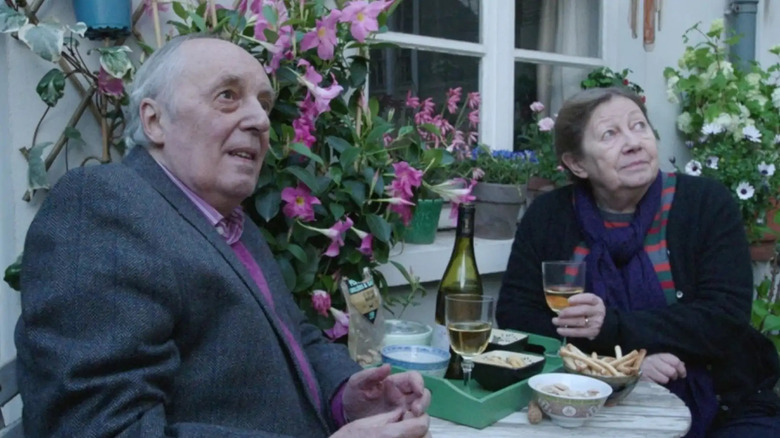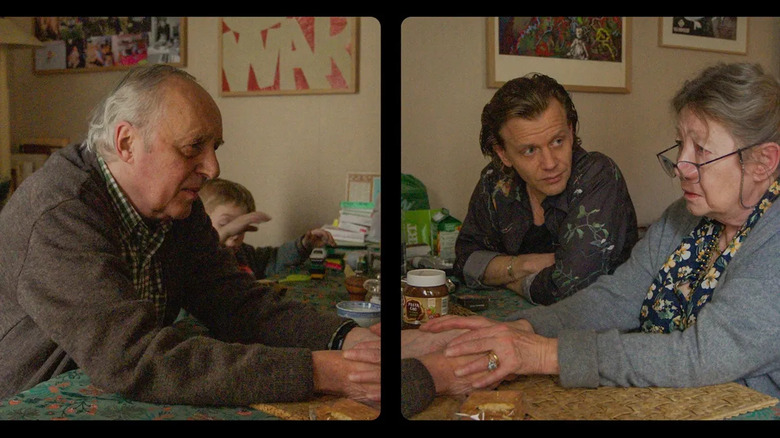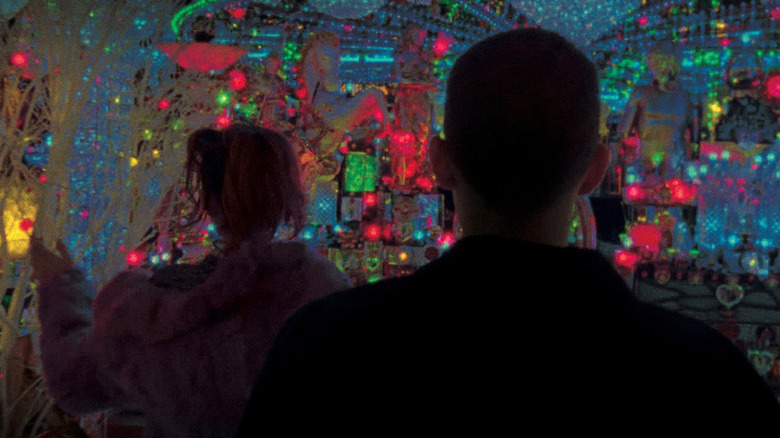Vortex Director Gaspar Noé On Crying, Death, And Drugs [Interview]
"Did you cry?"
It's not a question typically asked by a filmmaker during an interview. Then again, Gaspar Noé isn't like most filmmakers. The question is more than apt for his latest picture, "Vortex." Mother (played by Françoise Lebrun) is living with dementia, while The Father (Dargio Argento) experiences declining health as well, and The Son (Alex Lutz) copes. As expected from Noé, he doesn't pull any punches. And unlike a lot of dramas about serious illnesses, he never offers up moments of catharsis or comfort about a terrible disease.
From beginning to end, this is a brutal story. As it should be.
"Vortex" isn't the only new Noé movie coming to theaters. There's also "Lux Æterna," which is an anxious attack on the senses about filmmaking. The last ten minutes, in particular, are a maddening trip. Recently, we had the pleasure of speaking with Noé, mostly about "Vortex," death, drugs, and cinema.
'I cry a lot in my life'
I never have a passive reaction to your movies, so thank you for that.
Awesome. Thank you. Did you cry watching "Vortex?"
Yes. I appreciated you never tried to provide catharsis or anything to make an audience feel better.
I was asking because I feel it's very normal to cry. I made a melodrama and I wanted people to cry. But when people say, "No, I did not cry, but it touched me," I'm always scared by people who say, "I didn't cry."
I cry a lot in my life. I've been through similar situations and I know what it feels like having a mother with dementia. I know how much I cried when she died. You make a movie and you try to share some of your feelings, past feelings or whatever, and then when people say, "I didn't cry," I didn't succeed with my movie.
Maybe they'll think more about it and cry down the line, though.
It's one movie that I saw many years ago, but I couldn't stop thinking about it. It was "4 Months, 3 Weeks and 2 Days." I never had to deal with abortion myself. The portrayal of abortion in that movie, wow. I couldn't get rid of some scenes and images for years.
So, wanting an audience to cry, do you think about how you want an audience to react when you make a movie?
At least now, probably this movie seems like a more serious rollercoaster for an adult audience, but I like making movies, rollercoasters, to make people scream, cry, love, whatever. Mostly, my previous movies were all dealing with young characters. My audience was very young because I felt attracted to the subjects of the movie, a young drug dealer or a young wannabe filmmaker discovering passion in France with one, two girls. You can understand why a young audience would go to see those movies.
In this case, I wanted to do a movie that's always one of my movies, but with characters who would be much older than me. I'm very close to my father. I was extremely close to my mother too, who died eight years ago. For me, a hero or an antihero of a movie can be of any age. You can also make a movie with a four-year-old character. It will be as touching as a movie with an eighty-year-old character or 20-year-old character.
Despite the differences between "Vortex" and your past work, there are still many connections, right?
Yeah. Even the character of Dario Argento, who's a film critic in the movie, an 80-year-old film critic, he's an extension of the wannabe filmmaker character played by Karl Glusman in "Love." That's a guy studying cinema. Then at the end of that movie, he ended up having a baby with his neighbor instead of having a baby with his passionate love. Probably the character played by Karl Glusman could become the character played by Dario Argento years later, and the little baby in that movie "Love" could become the character of The Son in this movie, a 45-year-old junkie. There are some similarities.
Do you think about your filmography in a broader sense and what the body of work says?
I'm not careful about what my filmography is going to be. People who think of how the body of work is going to be exposed in a museum — the posterity for filmmakers is very different from the posterity for a painter. My father is a painter, and he's very worried about how his paintings are going to be shown after his death or during his lifetime.
In my case, nowadays, the VHS are not watchable anymore. Some people have DVD players, but it's going to disappear. Probably tomorrow, some big American company is going to buy all the rights of all my films through some French company that produced them. They're going to be put under the carpet because they're going to be shameful to be exposed. You don't know. Probably my whole body work is going to disappear in five years from now. You cannot tell how movies are going to be exposed in the future.
If your work got put away like that, how would you feel about it?
What can you do? At least you know that you do your best to expose your movies that are also not personal movies, they're collective movies, while you're alive. You can die at any moment and you have no control on what's going to happen next. I don't think the movies of today are going to survive like the novels or the paintings from the past. Even all these big filmmakers who made 20 movies, where do you see their prints? Probably at the French Cinematheque, there are some retrospectives, or the British BFI, but their movies wouldn't replay once over a period of 20 years. Mostly, the whole cinema is disappearing.
I talked to Monica Bellucci recently and, strangely enough, she said she hopes cinema survives.
Have you ever seen the new cut of "Irreversible?"
I haven't.
It's a straight cut, all chronological. It was released in Russia and Japan, in France, and in Germany. It came out as a double Blu-ray in England. If you can find the British Blu-ray, it has two versions. The new version for many people, it's more powerful in terms of emotion, because it's more sentimental. Also, it's more cruel because everything goes wrong at the end of the movie. When you see that movie, that new cut, the character of Monica becomes much more important. You can really tell how daring she was to do the movie. Try to grab a copy of the British Blu-ray of the "Irreversible" straight cut. You'll see, wow, the movie is even more shocking than the original one.
'The reality is everything falls apart inside your brain'
Do you look back or reflect a lot on your past work?
I try to avoid watching my old movies. They're also re-releasing "Enter the Void” on Blu-ray in England. They asked me to do a director's commentary. I re-watched it. I hadn't seen it since it was released. I don't like watching my old movies, because when I see them, immediately I want to reedit them, remix the sound, cut some frames, or retouch the color grading. I suffer because I like being active in front of a movie. I don't like being passive. I suffer watching them.
Although, I was surprised because I had forgotten half of the scenes and I said, "Well, it looks great," but I had also forgotten the names of almost everybody in the crew. I said, "Well, if I have to improvise the commentary on this, I could have done it one year, two years after making the movie," but if you do it 12 years later, you have nothing to say. You just watch a movie like you watch someone else working.
If you had brought a kid to this world, and then you put the kid in an orphanage and you saw the kid 12 years later, you would say, "Oh, yeah, the kid looks like me. I can recognize my blood in him, but his life is different from mine." It's a very weird feeling to watch your own movies, and not a very pleasant one.
Can you also look at that kid and be like, "He did okay there. He made some good stuff, too?"
What I like the most watching my movies are the things that I did not do intentionally, but things that happen on the set. For example, on "Enter the Void," the visual effects that Pierre Buffin, the VFX director, did are so beautiful. Just like you did a party and some people brought some stuff, food or chemicals, whatever, and then the party turned great. It was not only because of you hosting the party, it's because people had some skills to create those products and bring them to the table. "Enter the Void," it was like giving a party and my friends were bringing their personal drugs that made a crazy party.
As you said, your father cares about how his work is perceived, but do you? How much do festival experiences or audience reactions mean to you?
I don't trust the film critics. You're proud or you're not proud of what you've done. In this case [of "Vortex"], the presence of good reviews is incredibly higher than for all my last ones. Probably the one for which I had the worst reviews proportionally was "Love,” because I had exposed some genitals on screen and half of the people were shaking as if they had seen the face of the devil.
In this case, the subject of dementia is so universal. Every single family has to deal with cases of dementia or other horrible issues of aging. I think most film critics are between 35 and 65. They have parents or grandparents who are going through this kind of situation. I noticed that this movie talks in an intimate way to much more people than all my other movies, because most people don't relate to young drug dealer. Most people don't relate to the wannabe filmmaker, trying to have threesomes in Paris. But everybody relates to a sweet son trying to save their parents from that Titanic that is going through dementia.
I like the word dementia. The problem with the word Alzheimer's, that is one of the different diseases, cognitive diseases that old people go through. Alzheimer's sounds like Frankenstein or a German gun or Oppenheimer. For me, Alzheimer's equals Oppenheimer. The reality of that disease, that doesn't need a name. The reality is everything falls apart inside your brain. People lose their words. They try to reinvent words and it's very, very psychotic.
Although I've done movies about altered states of consciousness, probably the worst case of a bad trip that I've seen in my life was seeing people with dementia, because you can also by moments be in a real state of terror when you go through it. You don't come out. You don't come back. It gets worse and worse every day.
In the case of Mother in the film, a doctor, it's always painful to watch someone go through that experience, and when they have a brilliant mind, it's just ... I don't want to say more painful, but do you know what I mean?
My mother had a huge mind. She had more books than the characters in the movie. Even my father who's alive, he's 88 years old and he's hyper creative, but he said, "I never expected that your mother would fall into pieces before me and she would die before me." You can never tell who's going to be struck by destiny before the other one. There's some inner biology that doesn't always show up in advance.
'If you want to see Enter the Void, take this mushroom'
For both "Lux Æterna" and "Climax," you said, "I don't know what this is going to be," before you shot them. With "Vortex," did you have a pretty clear idea of what it was going to be from the beginning?
You don't know how good it's going to be until the last moment for all my last movies. At the end [it] would always make sense. As a director, you try to make things happen in front of the camera, but then you edit everything. Whatever does not fit with your emotions or the emotions that you want to portray on screen, you get rid of those things in the editing process. You know what your emotional perspective is, in my case.
I had producers who are very hands off; they just give me what I need. They brought me the toys for two, three weeks to shoot the film and edit it with some freedom. The frame can change. The cinematic gimmicks can change, but at the end, you always recognize some kind of perception. I don't know how you would call that, the identity, whatever.
Your work tends to get a very visceral, full body reaction. Do you notice that when you see them play in a theater or talk to people about their experiences with your films?
I won't try watching this movie. I also like when people come to me and say, "You know what, thanks to you I met my girlfriend and we watched 'Love' together on our first date, and then we had sex. Then we stayed together for two years." [Laughs] I like how movies affect the personal stories of the people.
I'm sure with this particular movie, because this kind of situation is not very often portrayed in cinema. In real life, it's everywhere. In cinema, it very rarely shows up. Because my audience is very young, even when I'm showing the movie, I only see kids between 18 and 25 in the movie seats for a movie about this old couple.
I'm sure that most of my audience today for this movie is going to have my movie in mind when they'll find out that their grandmother is losing her mind or when their own dad starts mumbling and can't find someone's name. They'll think, "Oh sh*t, we're getting into 'Vortex.'" Sometimes, movies tell you in advance what can happen to you.
When did you realize your work connected with a younger audience?
My line producer for "Enter the Void" had a son who was 18 years old. The line producer is very open minded, but one day he went to Holland with his son. He was 18 or 19. He said, "Hey dad, should I try magic mushrooms?" This is legal in Holland. And the father says, "Okay, be careful, do it with the right people. You're 18. Do whatever you want." The kid said, "Want to come with me to pick up the best stuff at a coffee shop in Holland?" My line producer went with his son to this shop and they were selling magic mushrooms, but the seller was saying, "And this one, this one is Enter the Void. If you want to see Enter the Void, take this mushroom." My line producer couldn't believe that they were selling real mushrooms and advertising them like, "This is Enter the Void mushroom." [Laughs]
[Laughs] That's a strangely beautiful "life comes full circle" moment, since you first imagined "Enter the Void" during a mushroom trip in your 20s.
Yeah. I had taken a mushroom, and I ended up in the park all day. I thought I was a telepath, so I could read everybody's mind. I took the subway and tears were relentlessly coming out from my eyes, and people were watching, but it was just some chemical reaction that made my eyes itch and tears were coming out. I wasn't sad.
The day was very intense. At the end of the day, they were playing "Lady in the Lake" on TV, and I said, "Wow, what if I could do a POV of someone getting stoned? That would be a great movie." Because the "Lady in the Lake" is a movie from the point of view of the main character as if you were behind his eyes. And then, that started the whole project of "Enter the Void."
Then I said, "Imagine you see the guy. You see his life through his point of view, and then suddenly he dies and he's stoned, and then he gets into another dimension and you follow the ghost." I don't believe in ghosts. The only ghosts that exist are inside your head. It's your parents who died, or your grandparents who died, or the dog you lost, because dogs always die before you.
"Vortex" is now playing in select theaters and opens nationwide on May 6, 2022.



